The 100th anniversary of the First World War is now finished but the records will continue to be preserved at the Archives and accessible to current and future generations who want to know more about the time period. In addition, this blog will remain on our website as an additional resource.
January 2015 Posts:
- 26 January: Counting Down to the 100th Anniversary of Women’s Suffrage
- 19 January: Presentation of Badges at Winnipeg City Hall
- 12 January: The S.S. Nascopie
- 5 January: Thanks for the “Flours”
26 January 2015
Counting Down to the 100th Anniversary of Women’s Suffrage
While the war was being waged in Europe, times were changing in Manitoba.
On 28 January 1916, the government of Manitoba amended its Election Act to grant women the right to vote. Manitoba was the first province in Canada to grant this right. For the next year, we will be counting down to this 100th anniversary with posts pointing to records that document the women’s suffrage movement and the government’s response. It is notable that this advancement in women’s rights happened in the middle of the war.
The right to vote was granted in 1916 but women had been advocating for the vote for many years prior to the law being passed. The Archives has a petition filed in 1893 by approximately 5000 people (organized by the Woman’s Christian Temperance Union) regarding franchise for women.
The petition was filed in the Sessional Papers of the Legislative Assembly. These records document the business of the Legislative Assembly and include reports tabled in the House, Ministers’ statements, committee reports and petitions, among other records.
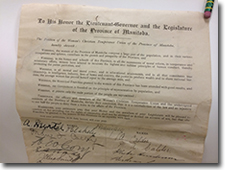
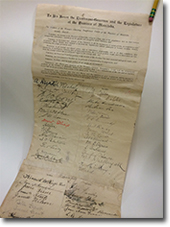
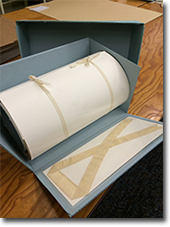
Search Tip: Search “Sessional Papers” in Keystone to find out more about the sessional papers held by the Archives of Manitoba. Search “Woman’s Christian Temperance Union” for records dating back to 1891.
Feedback (0)
E-mail us at [email protected] with a comment about this blog post. Your comments may be included on this page.
19 January 2015
Presentation of Badges at Winnipeg City Hall
This photograph depicts the presentation of badges bearing the City of Winnipeg crest to the 1100 men of the 27th Battalion on 14 April 1915. The 27th Battalion was given this honour because so many of the recruits were from Winnipeg. The 27th Battalion left for Great Britain on 16 May 1915 and landed in France on 18 September 1915.
In this large photograph (the print is approx. 20 cm x 65 cm), the 27th Battalion is standing in formation beside Winnipeg’s city market building which was located between Market Avenue, King Street, William Avenue and Princess Street. The large building behind the market building is Winnipeg City Hall and behind that is Main Street. (The photograph is taken looking east.)
The photograph was taken by Winnipeg’s Rembrandt Studio. The Archives of Manitoba holds two copies of the print, one lighter and one darker. The reproduction shown here was created from a black and white negative of the lighter print.

Search Tip: Search “Presentation of Badges” or “27th Battalion” in Keystone for more information.
Feedback (0)
E-mail us at [email protected] with a comment about this blog post. Your comments may be included on this page.
12 January 2015
The S.S. Nascopie
Over the course of the First World War, the Hudson’s Bay Company (HBC) assembled a fleet of over 250 ships to carry out its shipping and purchasing business in Europe. Of these, the S.S. Nascopie was perhaps its most famous. Commissioned by the HBC and built in 1911, the Nascopie was a 2500-ton steamer fitted with an icebreaking hull of heavy steel. The ship was designed to power through ice flows in the Canadian Arctic, bringing supplies to the HBC’s northern outposts. As the HBC entered into contracts with the French government, the Nascopie was handed a new assignment: moving supplies and munitions through enemy-patrolled waters in Europe.
The Nascopie’s first voyage as a wartime supply ship occurred in early 1915. The following letter from Captain G.E. Mack to the HBC’s Governor and Committee describes the eventful journey to Alexandrovsk, Russia, complete with rough seas, leaking forecastles, ice-covered bows and a collision with a rock upon entering the harbour. Interestingly, the letter was mistakenly dated “1915” and was filed with correspondence from the same year. The stamp on page 1 of the handwritten copy shows the correct year of the voyage.
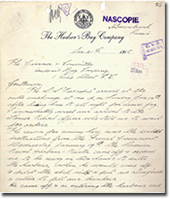
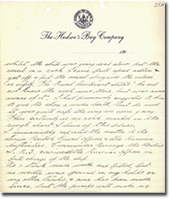
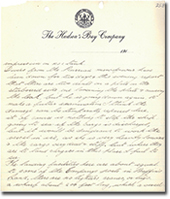
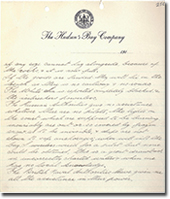
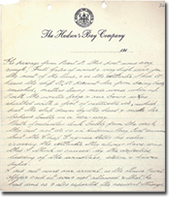
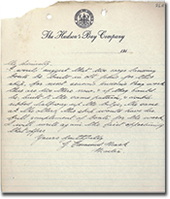
See a previous post about the Nascopie from 25 August 2014.
Search Tip: To find related correspondence, search Keystone with the keywords “Nascopie” or “Correspondence files for Hudson’s Bay Company’s wartime business with European governments.”
Feedback (0)
E-mail us at [email protected] with a comment about this blog post. Your comments may be included on this page.
5 January 2015
Thanks for the “Flours”
On the 23rd of December 1914, the town clerk for the borough of Bethnal Green in London, England, wrote a letter thanking the Premier of Manitoba for the province’s gift of 100 sacks of No. 1 hard wheat Manitoba flour, donated to the empire for “the relief of distress arising (…) in consequence of the War”. (See our December 15th blog post for records relating to the flour gift made by the Manitoba government.)
To show its appreciation for Manitoba’s gift of flour, the Bethnal Green borough council, headed by its mayor, moved to attach an extract of the council meeting minutes relating the acceptance of the gift, and to affix the seal of the mayor, aldermen, and councilors of the borough to it – a distinction reserved for important government matters, and one that was meant to show respect.
This record and many others like it are held by the Archives of Manitoba and make up a part of the “Premier’s office files” series.
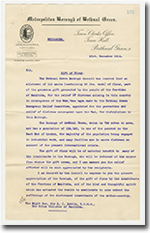
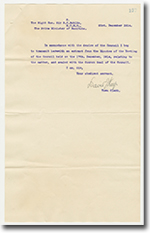
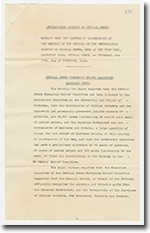
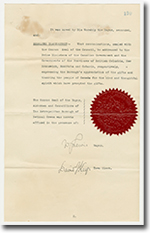
Search Tip: Search “Premier’s office files” in Keystone for more information on this series of records.
Feedback (0)
E-mail us at [email protected] with a comment about this blog post. Your comments may be included on this page.



